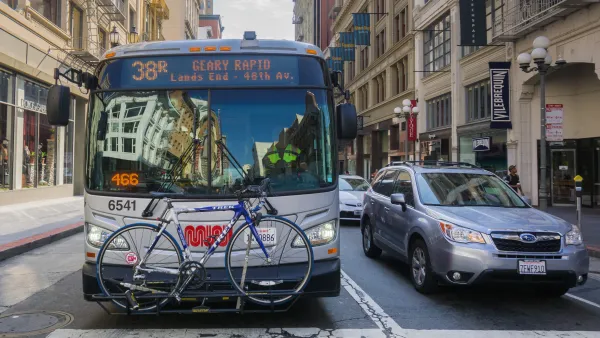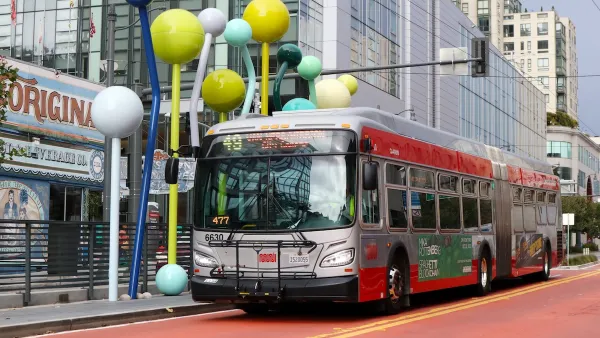Ryan Holeywell discusses a new report from researchers at the University of California, Berkeley that examines the top reasons people stop using public transit. Frequent, consistent service is most important to riders.
Findings presented this week at the Transportation Research Board's annual conference in Washington, D.C. may provide guidance for transit agencies trying to balance increases in ridership with strained budgetary environments. "While it's well-known that reliability is important to riders," says Holeywell, "it's less understood how, exactly, common transit problems impact the public's likelihood to reduce their ridership in the long-term."
So, in surveying public transit riders in the San Francisco area, the Berkeley researchers sought to dig deeper into the causes of "unreliability", and how they effect the mindset of riders.
"Frequent, consistent service -- and in particular, reliable transfers between stops -- are what's most important to riders, according to the study. Riders care most about getting picked up from their stop in 10 minutes or less, and they especially value being able to make their scheduled connections. They're not so interested in whether their rides are crowded or whether they can find a seat."
"But a few key things in particular irk passengers: delays that occur once they board a vehicle and delays when they're trying to make a transfer. Delays at transfer stops were more than twice as likely to make someone reduce their transit use than a delay at the point of origin. Riders were especially turned off by delays due to operational problems like backups in the system."
"At a time when transit agencies continue to take budgetary hurdles," concludes Holeywell, "the insights from the study are worth considering. Since certain failings have much larger impacts on ridership than others, it may be in public transportation agencies' best interest to focus resources on minimizing those inconveniences in particular."
FULL STORY: Top Reasons People Stop Using Public Transit

Analysis: Cybertruck Fatality Rate Far Exceeds That of Ford Pinto
The Tesla Cybertruck was recalled seven times last year.

National Parks Layoffs Will Cause Communities to Lose Billions
Thousands of essential park workers were laid off this week, just before the busy spring break season.

Retro-silient?: America’s First “Eco-burb,” The Woodlands Turns 50
A master-planned community north of Houston offers lessons on green infrastructure and resilient design, but falls short of its founder’s lofty affordability and walkability goals.

Test News Post 1
This is a summary

Analysis: Cybertruck Fatality Rate Far Exceeds That of Ford Pinto
The Tesla Cybertruck was recalled seven times last year.

Test News Headline 46
Test for the image on the front page.
Urban Design for Planners 1: Software Tools
This six-course series explores essential urban design concepts using open source software and equips planners with the tools they need to participate fully in the urban design process.
Planning for Universal Design
Learn the tools for implementing Universal Design in planning regulations.
EMC Planning Group, Inc.
Planetizen
Planetizen
Mpact (formerly Rail~Volution)
Great Falls Development Authority, Inc.
HUDs Office of Policy Development and Research
NYU Wagner Graduate School of Public Service



























